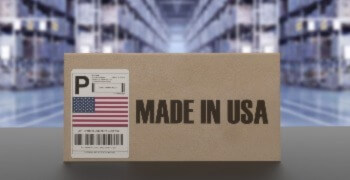
Business licenses: 3 common retail challenges and how to solve them
In 2022, then-eight-year-old Asa Baker made international news when her lemonade stand was shut down for lack of a business permit. Tween cousins, Maleah King and Milan Keith, had run into similar bureaucratic challenges with their stand the year before.
Fortunately for many young entrepreneurs, the list of states with lemonade stand exemptions continues to grow.
Unfortunately for business owners of all ages, licensing and permit challenges aren’t something we grow out of. Avalara recently teamed up with Chain Store Age to find out what retailers see as the biggest challenges for business license compliance. According to a survey of more than 100 retailers and restaurants, three of the common issues are:
Challenge #1: Knowing which licenses are required and where
The first step in license compliance is figuring out which ones you need. This is largely dependent on two factors:
What you sell
If you’re selling clothing, you probably just need a simple business operating license. But if you’re running a restaurant, you’ll likely need special permits for food, refrigeration, and sanitation as well. Got a bar in that restaurant? Alcohol is even more tightly regulated.
It’s a similar story for tobacco, explosives, chemicals, communications devices, firearms, energy … you get the idea. It’s not uncommon for one business to have several types of licenses.
What’s more, products are licensed differently in each state, which brings us to …
Where you sell
Say you have a location in Delaware. You’ll need to apply for federal, state, and any county or local licenses for both your business and any regulated products.
If you want to open a second location, you’ll have to make sure you follow permitting rules for the new county and city or town (no, your documents aren’t transferable).
What about selling online? Once again, it comes down to what you sell and where you sell it. If you sell enough goods into a state to trigger their economic nexus thresholds, you must register with the state tax authority for a sales tax permit and obtain any necessary business licenses. Registering for a business license is not the same as registering for a sales tax permit.
If business is booming and you opt to set up warehouses closer to customers, you’ll establish physical presence and must register for applicable licenses and permits in those states as well.
Challenge #2: Difficulty with applications and renewals
Once you know where you’re required to have licenses, it’s time to apply. In years past, this meant requesting and filing paper forms with each authority. Then came the internet in all its digital communication glory. Record keepers cheered at the potential for simplification.
You can now apply for business licenses online in many (but not all) jurisdictions, meaning fewer phone calls, letters, envelopes, and stamps. Simpler for sure, but far from the bureaucratic deliverance we had in mind. Even when you can apply online, each state and locality still has its own system with its own requirements. And there’s no standard application process or expiration protocol across governments.
For a digital system, licensing applications and renewals require a shocking amount of manual management on the back end.
A lot of businesses use spreadsheets to track application sites and due dates. But if you’re managing more than a handful of licenses, it’s easy to lose track of varied requirements across multiple states and no amount of spreadsheet mastery will account for legislative changes and updates.
Challenge #3: Unclear ownership and processes
In a time when finding experienced staff can be challenging, it can be hard to dedicate people to defining and following processes for tasks that won’t generate revenue. Unfortunately, we don’t see too many “Aced the Licensing Audit” awards — and no one likes working a job that only gets noticed when something goes wrong.
But licenses are legally required for operating a business in the United States. And while staying compliant won’t boost your revenue, noncompliance can tank your bottom line, if not your entire business.
There can be a lot of confusion around who should be responsible for licensing, with candidates often including:
- Legal teams (because it’s a legal matter)
- Accounting departments (since it’s so closely related to taxes)
- Branch operators (local requirements, local managers)
- Human resources (employees and contractors are licensed too, right?)
There isn’t necessarily a right or wrong answer. The department best suited to handle licensing will vary from business to business. But one thing to note: Each of these teams has a range of other vital responsibilities. Regardless of who takes over licensing, they should be given the time and tools to properly create and manage the process.
The right process also depends on the particulars of your business. But it needs to include:
- Determining where licenses are required
- Determining which licenses are required
- Maintaining accurate information about each license
- Tracking when licenses expire
- Monitoring licensing requirements and changes
- Knowing when licenses need to be updated or renewed
You’re not in this alone
If this all sounds overwhelming, it doesn’t have to be. There are options to mitigate the challenges of maintaining business license compliance.
Many legal and accounting firms offer business licensing as part of their services. There are also bookkeepers and other contract personnel who can help manage licensing for you.
Another option is to use automation technology, like Avalara business licensing software. For staff pulled in multiple directions, automation can help you stay on top of licenses more efficiently and with fewer errors. Avalara can help you:
- Determine where you need to register your business
- Figure out which licenses you need
- Apply for registration and licenses in multiple locations
- Manage your license portfolio
Regardless of how you choose to manage licensing, it’s important for everyone to take compliance seriously. Licenses aren’t fun or flashy, but properly managing them can help your business avoid hits to your finances and reputation. And by creating a clear, efficient license management process, you can focus more time on generating revenue and growth.
Survey methodology
Avalara and Chain Store Age invited retail executives to complete an online survey in June 2022.
More than 100 retailers and restaurants replied, ranging from small companies to those managing multiple stores.

Avalara Tax Changes 2026 is here
The 10th edition of our annual report engagingly breaks down key policies related to sales tax, tariffs, and VAT.
Stay up to date
Sign up for our free newsletter and stay up to date with the latest tax news.















